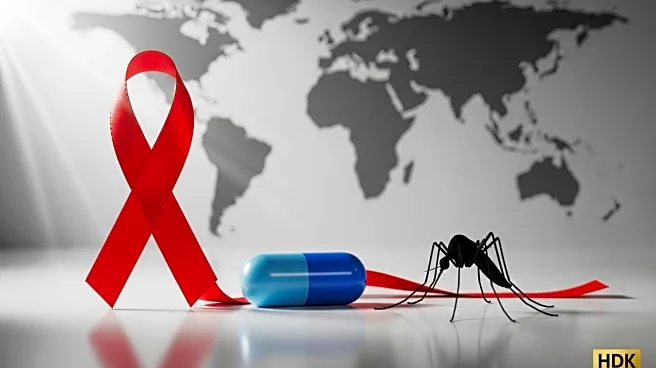What's Happening?
Bill Gates has announced a pledge of $912 million through the Gates Foundation to fight AIDS, tuberculosis, and malaria. This pledge was made during a Reuters Newsmaker event in New York, highlighting the urgent health risks faced by African children, particularly in northern Nigeria where child mortality rates are alarmingly high. The donation matches the foundation's previous contribution in 2022, coinciding with the Global Fund's three-year budget cycle. Gates emphasized the importance of sustained funding for global health initiatives, especially as government aid, including from the United States, has seen reductions. The Goalkeepers event, which Gates referenced, aims to accelerate progress on United Nations global development goals, including health improvements and poverty eradication.
Why It's Important?
The pledge by Gates is significant as it addresses the critical funding gap in global health initiatives, which have seen a 21% decline in development assistance between 2024 and 2025. This reduction poses a threat to the progress made in reducing child mortality rates, which have halved since 2000. Africa bears a disproportionate burden of diseases like AIDS, tuberculosis, and malaria, with Sub-Saharan Africa accounting for a large percentage of global HIV cases. The funding is crucial for maintaining healthcare systems and implementing innovations like the HIV prevention drug lenacapavir, which could save additional lives. Gates' commitment underscores the need for continued investment in primary healthcare and disease prevention.
What's Next?
Organizations like the Global Fund are actively seeking to raise funds before the year's end to prevent setbacks in global health progress. The Gates Foundation's pledge may encourage other donors to contribute, potentially mitigating the impact of reduced government aid. The focus will likely remain on sustaining funding for healthcare initiatives and exploring innovative solutions to combat infectious diseases. Stakeholders in global health, including governments and non-profits, may need to reassess their funding strategies to ensure continued support for vulnerable populations.
Beyond the Headlines
The reduction in global health funding raises ethical concerns about the responsibility of wealthier nations to support developing countries in combating preventable diseases. The Gates Foundation's efforts highlight the role of private philanthropy in filling gaps left by government aid cuts. Long-term, this situation may prompt discussions on the sustainability of relying on private donations for essential health services and the need for more equitable global health funding models.










